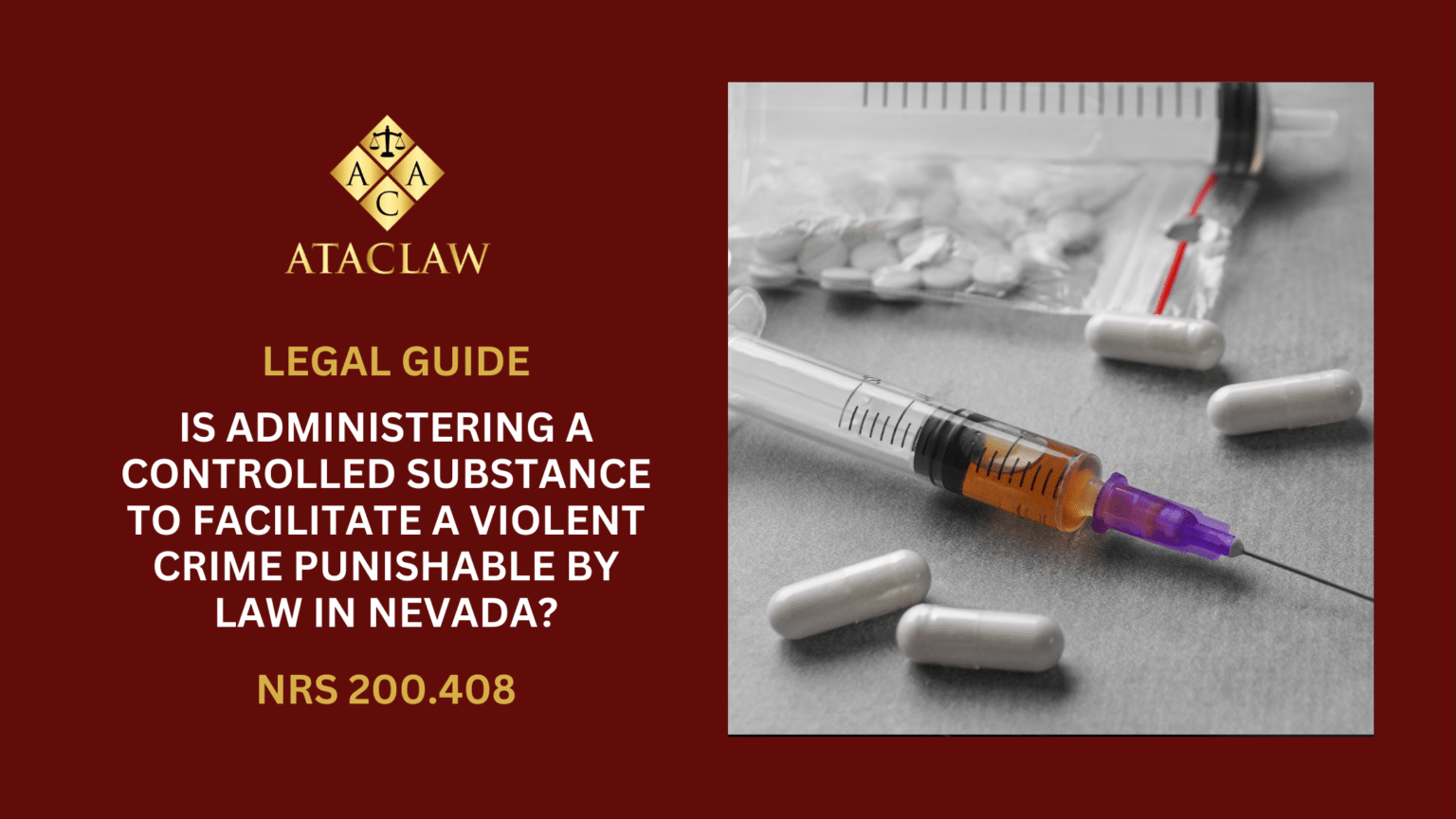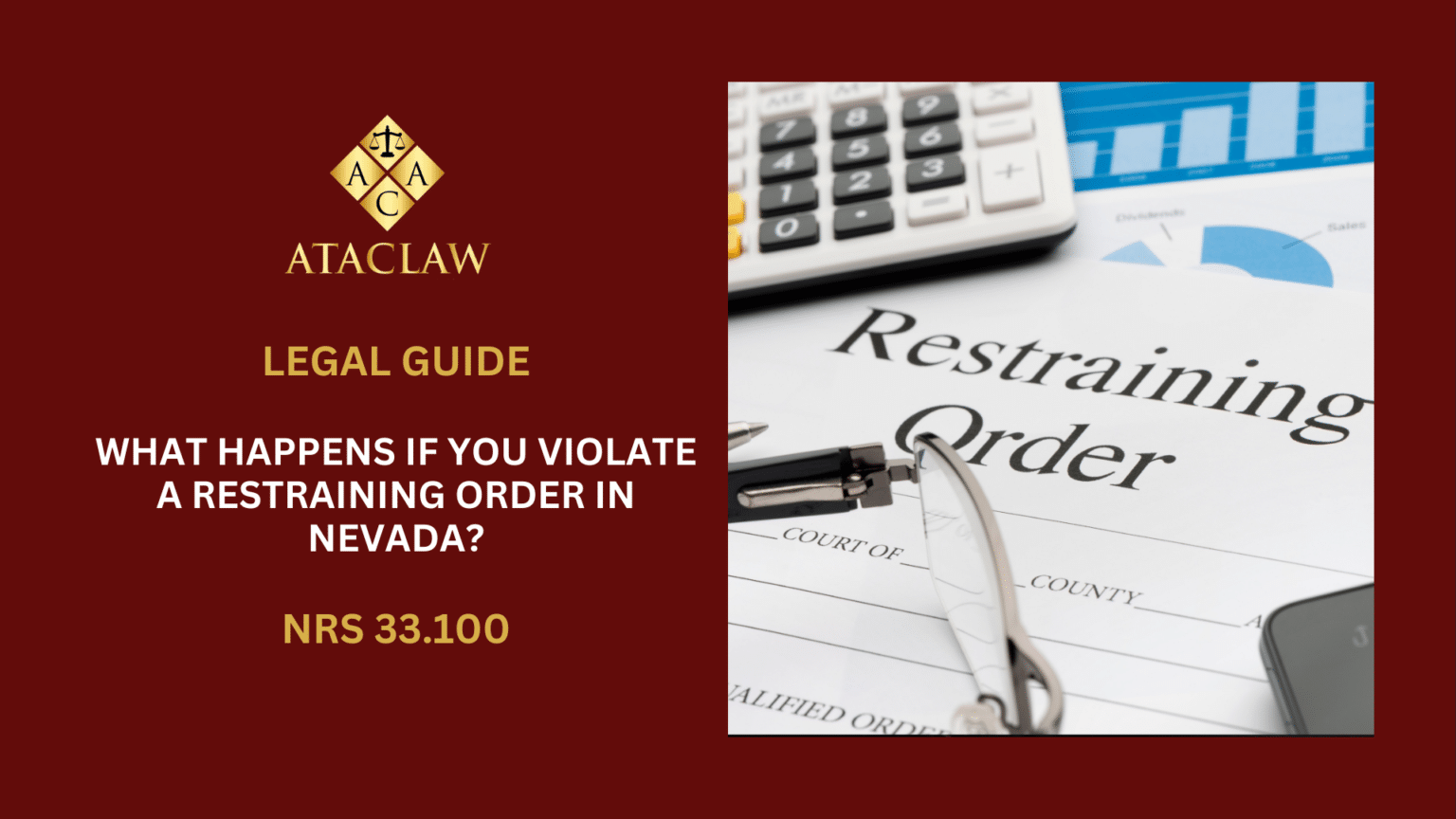In the state of Nevada, the crime of administering a controlled substance to aid in the commission of a violent crime is taken very seriously. At ATAC LAW, we often encounter questions about this specific offense, notably described under Nevada Revised Statute (NRS) 200.408. This law outlines an offense that is both unique and severe in its implications and potential penalties. Here, we delve into the nuances of this statute, shedding light on the legal ramifications and defenses for those accused under NRS 200.408.
Could Administering Drugs Without Consent Lead to Violence Charges in Nevada?
Nevada law strictly penalizes a narrowly defined crime under NRS 200.408, targeting situations where individuals administer controlled substances to others without their consent for nefarious purposes. In essence, this statute criminalizes the act under three specific conditions:
- A person deliberately gives a controlled substance to another individual;
- The recipient of the substance is unaware of its administration (or is unable to legally consent, for instance, when unconscious); and
- The intent behind administering the drug is to facilitate the commission of a “crime of violence” against the person or their property.
A “crime of violence” is broadly defined to include any act that involves the use or threat of force against another person or their property, as well as felonies that have a significant risk of involving force or violence. Crimes of violence encompass not only felonies but also some misdemeanors, such as simple assault or battery, when they involve threatened or actual force.
Consider this scenario for illustration:
Example: Alex discreetly mixes the “date rape drug” Rohypnol into Chris’s beverage. After Chris is incapacitated by the drug, they engage in sexual activities.
In this scenario, Alex could be charged with sexual assault (NRS 200.366) due to Chris being unaware of the drug, which impaired their ability to consent. Here’s another example:
Example: Alex spikes Chris’s drink with Ambien, misleadingly claiming it is merely a pain reliever. Once Chris is affected by the drug, Alex facilitates an acquaintance, Pat, to enter Chris’s residence to vandalize it.
In this case, Alex’s deception regarding the substance’s nature means Chris was not truly informed, fulfilling the condition of administering without consent. Moreover, even though Alex was not the one who directly damaged the property, their action in drugging Chris to assist Pat’s vandalism aligns with the provisions of NRS 200.408, making Alex criminally responsible.
NRS 200.408 singles out these specific actions due to their potential to facilitate violent crimes under the guise of unawareness or incapacitation. The legislation’s focused nature underscores Nevada’s commitment to combatting and penalizing such covert methods of enabling violence or property damage.
What Are the Consequences of Illegally Using Drugs to Commit Violent Crimes in Nevada?
Nevada has strict laws against the misuse of controlled substances, especially when drugs are used as a tool to facilitate violent criminal activities. Under NRS 200.408, such actions are classified as a Category B felony, highlighting the serious nature of these offenses. Individuals found guilty of this crime face severe repercussions, including imprisonment ranging from (1-20) one to twenty years. This stringent punishment reflects Nevada’s commitment to deterring crimes that involve drugging victims without their consent to commit or enable acts of violence.
The legal troubles for the accused don’t stop with the conviction for administering drugs without consent. Offenders may also endure additional penalties related to the violent crimes they intended to commit or did commit after drugging their victims. This layered approach to sentencing underscores the comprehensive measures Nevada employs to combat and punish criminal behaviors that endanger the safety and well-being of its residents.
Could a Conviction under NRS 200.408 Lead to Deportation in Las Vegas?
In Las Vegas, non-citizen residents convicted under NRS 200.408 may face deportation after serving their sentence, as such offenses are often deemed crimes involving moral turpitude. Experienced attorneys, however, might successfully negotiate these charges down to lesser offenses, which could protect the individual’s resident status and prevent deportation. Non-citizens should seek qualified legal representation to address the potential immigration repercussions of their case.
What Are the Effective Defense Strategies Against NRS 200.408 Charges in Nevada?
Legal defense strategies in a criminal case hinge on its specific circumstances, especially with charges under NRS 200.408 in Las Vegas. Possible defenses include the absence of violent intent, involvement of non-controlled substances, or the victim’s consent.
1. Absence of Violent Intent
A key defense to NRS 200.408 accusations is demonstrating the defendant’s lack of intent to facilitate a violent crime. For instance, an individual who inadvertently contributes to another person’s trespassing, without the aim to promote a violent act, may argue against the appropriateness of NRS 200.408 charges, possibly facing lesser allegations like trespass or simple battery instead.
2. Substances Not Classified as Controlled
Another effective rebuttal arises if the substance involved is not legally recognized as a controlled substance. In such a scenario, prosecuting under NRS 200.408 doesn’t apply. If an individual dispenses a legal substance, even if force is subsequently used, the charge might be downgraded to a less severe offense, such as misdemeanor battery.
3. Victim’s Knowledge of the Substance
If the individual consuming the substance does so with full knowledge and consent, the premise of a NRS 200.408 charge collapses. An example of this would include a situation where the substances, albeit utilized, were taken voluntarily and with awareness by the victim, negating the charge and possibly redirecting to a simple assault charge at most.
The prosecution’s task to prove the defendant’s intent can often be perplexing, owing to the intangible nature of someone’s state of mind. Consequently, reliance on indirect or “circumstantial” evidence such as digital communications or witness statements becomes pivotal in these cases.
Collectively, these defenses introduce reasonable doubt regarding the elements of crimes under NRS 200.408. Legal professionals evaluate the tangible evidence, or lack thereof, to safeguard against unjust prosecution and argue for the dismissal or reduction of charges in light of the actual details surrounding the alleged offense.
Is It Possible to Seal Arrest Records for Dismissed NRS 200.408 Charges?
In Nevada, it’s generally not possible to seal records of convictions under NRS 200.408. However, if the charges are dismissed without a conviction, individuals can promptly request the sealing of their arrest record from the court.
What Are Some Related Drug-Related Offenses in Nevada?
Assisting Felonies Through Drug Administration
Under Nevada law, specifically NRS 200.405, the facilitation of felony activity by providing drugs carries a B felony classification. Unlike the related NRS 200.408 statute, this particular infraction holds a maximum confinement duration of a decade.
Holding Illicit Substances
NRS 453.336 speaks to the possession of controlled substances, where an individual holds or controls banned narcotics with the intention for personal consumption. The legal repercussions are dependent on the category of the drug involved and any previous infractions on the record of the accused.
Plotting to Commit an Offense
Defined in NRS 199.480, conspiracy involves a mutual agreement between at least two individuals to commit an unlawful act, regardless if the planned crime is ultimately executed or not. The degree of punishment is dictated by the nature of the crime that was intended to be committed.
If you find yourself navigating charges under NRS 200.408, it’s crucial to seek specialized legal guidance. At ATAC LAW, we leverage our expertise in Nevada’s legal intricacies to offer comprehensive support and defense strategies. Understanding the subtleties of consent and the nature of administered substances can be pivotal in these cases. For anyone facing allegations or seeking clarity on NRS 200.408, reaching out to a knowledgeable legal team is a vital step. The landscape of controlled substances and violent crimes demands nuanced legal interpretation and a robust defense, domains where ATAC LAW stands ready to assist.
For further legal assistance and to discuss your case with an expert, don’t hesitate to contact ATAC LAW.




